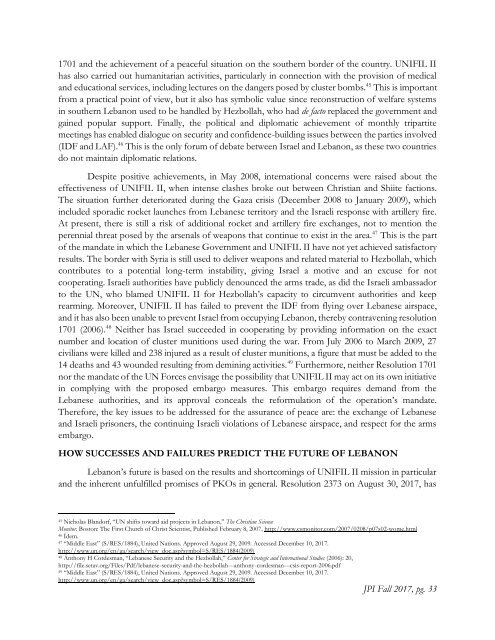Fall 2017 JPI
You also want an ePaper? Increase the reach of your titles
YUMPU automatically turns print PDFs into web optimized ePapers that Google loves.
1701 and the achievement of a peaceful situation on the southern border of the country. UNIFIL II<br />
has also carried out humanitarian activities, particularly in connection with the provision of medical<br />
and educational services, including lectures on the dangers posed by cluster bombs. 45 This is important<br />
from a practical point of view, but it also has symbolic value since reconstruction of welfare systems<br />
in southern Lebanon used to be handled by Hezbollah, who had de facto replaced the government and<br />
gained popular support. Finally, the political and diplomatic achievement of monthly tripartite<br />
meetings has enabled dialogue on security and confidence-building issues between the parties involved<br />
(IDF and LAF). 46 This is the only forum of debate between Israel and Lebanon, as these two countries<br />
do not maintain diplomatic relations.<br />
Despite positive achievements, in May 2008, international concerns were raised about the<br />
effectiveness of UNIFIL II, when intense clashes broke out between Christian and Shiite factions.<br />
The situation further deteriorated during the Gaza crisis (December 2008 to January 2009), which<br />
included sporadic rocket launches from Lebanese territory and the Israeli response with artillery fire.<br />
At present, there is still a risk of additional rocket and artillery fire exchanges, not to mention the<br />
perennial threat posed by the arsenals of weapons that continue to exist in the area. 47 This is the part<br />
of the mandate in which the Lebanese Government and UNIFIL II have not yet achieved satisfactory<br />
results. The border with Syria is still used to deliver weapons and related material to Hezbollah, which<br />
contributes to a potential long-term instability, giving Israel a motive and an excuse for not<br />
cooperating. Israeli authorities have publicly denounced the arms trade, as did the Israeli ambassador<br />
to the UN, who blamed UNIFIL II for Hezbollah’s capacity to circumvent authorities and keep<br />
rearming. Moreover, UNIFIL II has failed to prevent the IDF from flying over Lebanese airspace,<br />
and it has also been unable to prevent Israel from occupying Lebanon, thereby contravening resolution<br />
1701 (2006). 48 Neither has Israel succeeded in cooperating by providing information on the exact<br />
number and location of cluster munitions used during the war. From July 2006 to March 2009, 27<br />
civilians were killed and 238 injured as a result of cluster munitions, a figure that must be added to the<br />
14 deaths and 43 wounded resulting from demining activities. 49 Furthermore, neither Resolution 1701<br />
nor the mandate of the UN Forces envisage the possibility that UNIFIL II may act on its own initiative<br />
in complying with the proposed embargo measures. This embargo requires demand from the<br />
Lebanese authorities, and its approval conceals the reformulation of the operation’s mandate.<br />
Therefore, the key issues to be addressed for the assurance of peace are: the exchange of Lebanese<br />
and Israeli prisoners, the continuing Israeli violations of Lebanese airspace, and respect for the arms<br />
embargo.<br />
HOW SUCCESSES AND FAILURES PREDICT THE FUTURE OF LEBANON<br />
Lebanon’s future is based on the results and shortcomings of UNIFIL II mission in particular<br />
and the inherent unfulfilled promises of PKOs in general. Resolution 2373 on August 30, <strong>2017</strong>, has<br />
45 Nicholas Blandorf, “UN shifts toward aid projects in Lebanon,” The Christian Science<br />
Monitor. Boston: The First Church of Christ Scientist, Published February 8, 2007, http://www.csmonitor.com/2007/0208/p07s02-wome.html<br />
46 Ídem.<br />
47 “Middle East” (S/RES/1884), United Nations. Approved August 29, 2009. Accessed December 10, <strong>2017</strong>.<br />
http://www.un.org/en/ga/search/view_doc.asp?symbol=S/RES/1884(2009)<br />
48 Anthony H Cordesman, “Lebanese Security and the Hezbollah,” Center for Strategic and International Studies (2006): 20,<br />
http://file.setav.org/Files/Pdf/lebanese-security-and-the-hezbollah---anthony-cordesman---csis-report-2006.pdf<br />
49 “Middle East” (S/RES/1884), United Nations. Approved August 29, 2009. Accessed December 10, <strong>2017</strong>.<br />
http://www.un.org/en/ga/search/view_doc.asp?symbol=S/RES/1884(2009)<br />
<strong>JPI</strong> <strong>Fall</strong> <strong>2017</strong>, pg. 33
















